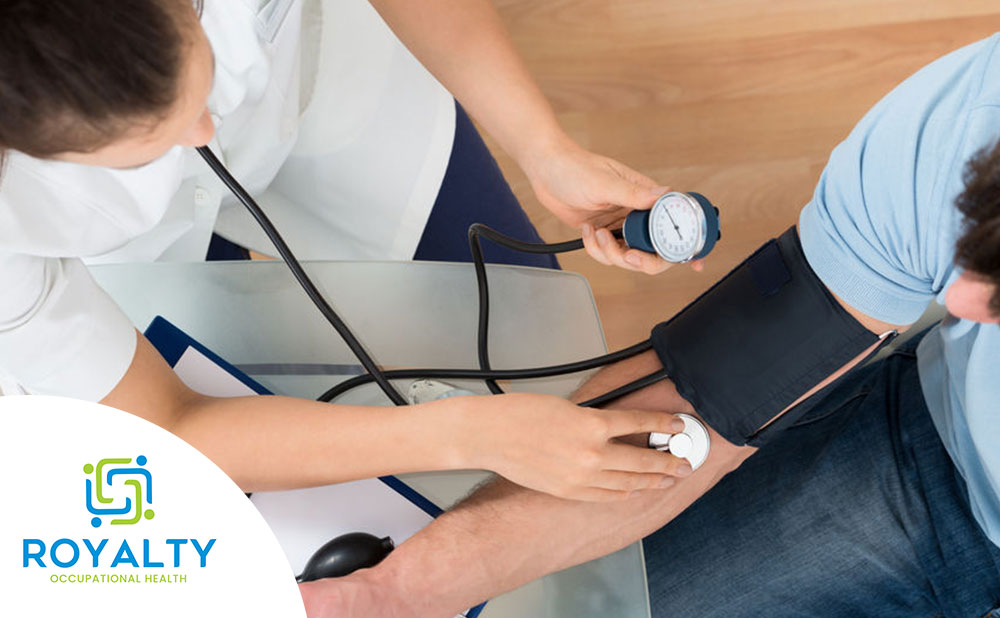
🩺 Medical Surveillance in the Workplace
In high-risk industries, medical surveillance is not just good practice — it is a legal and ethical obligation. At Royalty Occupational Health Services, we specialize in comprehensive medical surveillance programmes that help employers monitor employee health, prevent occupational diseases, and comply with South African workplace safety laws.
Whether your business operates in mining, construction, manufacturing, or logistics, regular health surveillance ensures your employees are fit for duty and protected from workplace hazards.
🔎 What is Medical Surveillance?
Medical surveillance is a planned programme of periodic health assessments carried out by occupational health practitioners. It is designed to detect early signs of work-related illnesses and evaluate the impact of workplace exposures on employee health.
A typical programme may include:
-
Medical history and physical examinations.
-
Lung function and vision tests.
-
Audiometric (hearing) screenings.
-
Chest X-rays for high-risk employees.
-
Biological monitoring (e.g., drug testing, chemical exposure).
-
Risk-based assessments based on industry hazards.
⚖️ Why is Medical Surveillance Important?
The Occupational Health and Safety Act (OHS Act, 1993) requires employers to safeguard the health of their employees. For industries where workers are exposed to dust, chemicals, noise, or other risks, medical surveillance is a critical component of compliance.
Key benefits include:
-
Early detection of occupational diseases such as TB, silicosis, or hearing loss.
-
Reduced absenteeism by managing health issues before they worsen.
-
Improved productivity through a healthier workforce.
-
Legal protection for employers by maintaining medical records.
-
Safer workplaces that enhance employee trust and morale.
🏭 Industries That Require Medical Surveillance
Medical surveillance is essential in industries where employees face ongoing health risks, including:
-
Mining and Quarrying – exposure to dust and silica.
-
Construction – cement, asbestos, and chemical hazards.
-
Manufacturing and Engineering – fumes, noise, and repetitive stress injuries.
-
Transport and Logistics – medical certification for drivers and operators.
-
Food Handling & Agriculture – exposure to biological and chemical agents.
Royalty OHS tailors surveillance programmes to each industry’s risks, ensuring precise, effective monitoring.
📊 Types of Medical Examinations in Surveillance
Our medical surveillance programmes include:
-
Pre-placement medicals – ensuring new employees are fit for their roles.
-
Periodic health screenings – regular check-ups during employment.
-
Transfer medicals – assessments when employees change roles.
-
Exit medicals – documenting health status when employees leave.
Each stage helps employers build a clear record of workplace health and compliance.
💡 Why Choose Royalty OHS for Medical Surveillance?
-
Comprehensive programmes tailored to your industry risks.
-
Mobile and on-site services to minimize downtime.
-
Experienced occupational health practitioners with over a decade of expertise.
-
Affordable solutions for small businesses and large corporations alike.
-
Compliance support with regulatory reporting and submissions to the Department of Mineral Resources (DMRE).
When you partner with Royalty OHS, you get more than a service — you get a long-term health management solution.
✅ Conclusion
Medical surveillance is one of the most effective ways to protect employee health, reduce risks, and comply with workplace regulations. By identifying occupational health issues early, businesses save costs, improve productivity, and demonstrate genuine care for their employees.
At Royalty Occupational Health Services, we deliver reliable, professional medical surveillance programmes across Johannesburg and South Africa.
Frequently Asked Questions
Medical surveillance is a programme of regular medical check-ups designed to monitor employee health and detect work-related illnesses early.
Industries such as mining, construction, manufacturing, and logistics require medical surveillance by law to protect employees from occupational hazards.
The frequency depends on workplace risks, but typically employees undergo surveillance annually or periodically as required by regulations and company policy.
